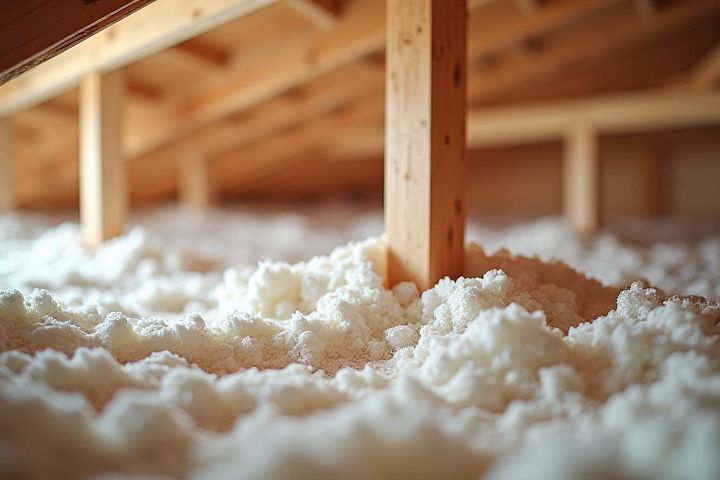
House insulation is crucial for maintaining a comfortable indoor temperature, as it minimizes heat transfer between the interior and exterior environments. Proper insulation can significantly reduce your heating and cooling costs, enabling energy efficiency and lowering utility bills. By preventing air leaks, insulation improves indoor air quality, reducing the risk of moisture buildup and mold growth. It also contributes to noise reduction, providing a quieter living space by blocking external sounds. Investing in high-quality insulation not only enhances your home's energy performance but also increases its overall value and market appeal.
Why House Insulation Is Necessary
Reduces energy bills
House insulation plays a critical role in reducing energy bills by minimizing heat transfer between the interior and exterior environments. Effective insulation can lower heating and cooling costs by up to 30%, depending on the climate and the home's design. Insulated homes maintain a consistent indoor temperature, allowing HVAC systems to operate more efficiently and consume less energy. Investing in quality insulation not only contributes to lower monthly expenses but also enhances overall energy efficiency, reducing your carbon footprint significantly.
Enhances comfort
House insulation is essential for enhancing comfort by regulating indoor temperatures, keeping your home warmer in winter and cooler in summer. Proper insulation minimizes drafts and reduces noise pollution, creating a quieter environment for relaxation and productivity. By maintaining a consistent temperature, insulation helps you avoid the discomfort of extreme fluctuations, ensuring a more enjoyable living space. Investing in quality insulation not only boosts comfort but also increases your home's energy efficiency, leading to lower heating and cooling costs.
Minimizes heat loss
House insulation is essential for minimizing heat loss, which significantly enhances energy efficiency and comfort. Effective insulation materials, such as fiberglass, foam, and cellulose, create a barrier that reduces the transfer of heat between your home and the outside environment. By keeping warm air inside during the winter and blocking heat in the summer, properly insulated homes require less energy for heating and cooling, leading to lower utility bills. Investing in high-quality insulation not only enhances your home's thermal performance but also contributes to a reduced carbon footprint by curbing energy consumption.
Prevents drafts
Effective house insulation is essential as it significantly prevents drafts, enhancing overall energy efficiency. By minimizing air leakage, well-insulated homes maintain a more stable indoor temperature, ultimately reducing heating and cooling costs by up to 30%. Proper insulation materials, such as fiberglass or foam boards, can also reduce your dependence on heating systems during colder months. As a result, investing in quality insulation not only improves comfort but also contributes to a sustainable environment by lowering energy consumption.
Controls moisture
House insulation is essential for controlling moisture levels within your home, which helps prevent mold growth and structural damage. Proper insulation creates a barrier that minimizes the transfer of warm, moist air from inside your living spaces to the colder surfaces, thereby reducing condensation. This is particularly important in areas like attics and basements, where humidity can be problematic. By investing in quality insulation materials, you enhance energy efficiency while maintaining a healthier indoor environment for you and your family.
Reduces environmental impact
House insulation significantly reduces your environmental impact by minimizing energy consumption. Properly insulated homes require less heating in winter and cooling in summer, leading to decreased fossil fuel use and lower greenhouse gas emissions. According to the U.S. Department of Energy, insulation can cut energy bills by 20-50%, translating to substantial cost savings and resource conservation over time. By investing in quality insulation, you contribute to a more sustainable future while enhancing indoor comfort.
Increases property value
Investing in quality house insulation can significantly enhance your property's market value, often resulting in a return on investment of 80% to 100%. Proper insulation reduces energy costs by up to 30%, which is a compelling selling point for potential buyers. Properties with excellent insulation tend to command higher sale prices, as they are associated with lower utility bills and improved comfort. By prioritizing insulation, you not only increase energy efficiency but also make your home more attractive in a competitive real estate market.
Improves indoor air quality
House insulation significantly enhances indoor air quality by reducing the infiltration of outdoor pollutants and allergens. Proper insulation creates a more controlled environment, limiting the entry of dust, pollen, and harmful gases like carbon monoxide. When insulation is effective, it also minimizes moisture buildup, which can lead to mold growth and respiratory issues. As a result, investing in quality insulation can lead to healthier air in your home, making it a safer space for you and your family.
Dampens noise
House insulation is crucial for dampening noise, significantly enhancing your living environment's comfort. Studies show that homes with proper insulation can reduce sound transmission by up to 70%, mitigating disturbances from external sources like traffic or neighbors. The use of materials such as fiberglass, foam, or cellulose can effectively absorb sound waves, resulting in quieter interiors. Investing in quality insulation not only improves your home's acoustics but also contributes to energy efficiency and overall property value.
Supports energy efficiency compliance
House insulation significantly enhances energy efficiency by reducing heat loss in winter and heat gain in summer, leading to lower energy consumption. According to the U.S. Department of Energy, proper insulation can reduce heating and cooling costs by 10% to 50%. Moreover, energy-efficient homes often meet or exceed building codes and energy compliance standards, which can result in financial incentives or rebates for homeowners. Your investment in insulation not only improves comfort but also contributes to sustainability by minimizing your carbon footprint.
